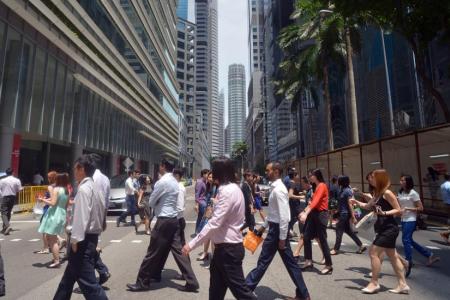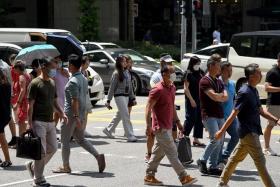Labour market needs to ride the tides of change
This year is likely to be better for job seekers, especially in certain sectors and pivotal roles
Singapore's labour market has softened dramatically since the record expansion of its economy in 2010.
According to the latest Ministry of Manpower figures, unemployment is at a six-year high, the number of job redundancies increased to more than 19,000 last year and, of those who were made redundant, only 48 per cent were able to successfully re-enter employment.
This was the lowest since 2010, when the rate was 53 per cent.
What has caused this clear shift in employment prospects? There are several obvious contributors, including headwinds in global trade and weak domestic consumer confidence.
Additionally, economic restructuring and technology adoption is giving rise to a paradigm shift in how work has historically been done.
Jobs are increasingly getting segmented into two broad categories.
There are "pivotal" job roles which are high value-adding and have limited supply of talent.
And then there are the "democratised" jobs where technology is fragmenting traditionally skilled work into tasks that can increasingly be performed by less skilled talent.
Despite last year's difficulties for job seekers in Singapore, this year is likely to present a more positive outlook for certain sectors and pivotal job roles.
We believe that organisations still have the intent to hire new employees this year, with demand for talent in key segments - revealed by Willis Towers Watson research to include information technology (IT), engineering, and sales and marketing - increasing in response to the changing business landscape.
It is no coincidence that some of these talent segments also provide critical support to Singapore's growth as a hub for digital and fintech businesses.
Many of these job functions (with customer service also thrown into mix), where hiring is still strong, are expected to drive the business' transformational agenda and top line growth.
Sales and customer service teams will continue to be critical to most organisations where personal touch or relationships are still valued.
On the other hand, skilled IT and engineering professionals will help their organisations create competitive advantages by paving new ways to engage, service and sell to varied customer segments digitally.
SOURCING TALENT
The dynamics of sourcing talent are also changing.
Job tasks and critical skills requiring high technical competency or low technical competency will each shift into different talent platforms (for example, contingent workers, automated processes, third party vendors, alliance partners).
Talent supply and demand and cost control requirements will make it critical for businesses to prepare technological and human capital roadmaps as they look to varying employment relationships to meet their manpower needs.
Job seekers also need to adapt to the evolving market.
For example, they can maximise their chances of securing employment by looking beyond full-time positions and remain open-minded about taking on contractual employment.
Singapore workplaces are already operating mobile and virtual set ups and freelance or "contingent" workers are an important component of modern workforce strategies.
Employees should also set their sights on the long term, rather than the year ahead.
Our research leads us to conclude that, in a volatile business environment with rapid disruption of existing business models, career security for job seekers is more important than job security alone.
The implication here is that companies need to support lifelong learning to build employability and breed more innovative thinkers, while employees need to take ownership of their skill sets.
This is very much the premise of the Government's SkillsFuture initiative.
It is hard to anticipate how Singapore's economy will continue to perform for the rest of the year given the significant geopolitical, social and economic forces at work.
In the immediate term, it would be a surprise if the unemployment rate falls much further than the current levels.
In the longer term, Singapore's economic restructuring will position the nation to better ride the tide of technology disruption and increased regional competition.
It is up to both employers and employees to understand how talent will fit within that picture, and to then take the necessary steps to secure their own futures.
The writer is the country leader of talent and rewards at Willis Towers Watson
Get The New Paper on your phone with the free TNP app. Download from the Apple App Store or Google Play Store now



